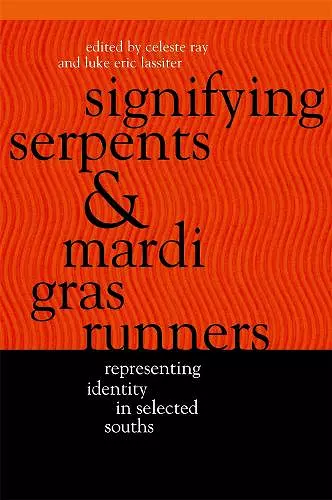Signifying Serpents and Mardi Gras Runners
Representing Identity in Selected Souths
Luke Eric Lassiter editor Celeste Ray editor
Format:Hardback
Publisher:University of Georgia Press
Published:1st Apr '17
Should be back in stock very soon

These case studies explore how competing interests among the keepers of a community's heritage shape how that community both regards itself and reveals itself to others. As editors Celeste Ray and Luke Eric Lassiter note in their introduction, such stakeholders are no longer just of the community itself, but are now often "outsiders"—tourists, the mass media, and even anthropologists and folklorists.
The setting of each study is a different marginalized community in the South. Arranged around three themes that have often surfaced in debates about public folklore and anthropology over the last two decades, the studies consider issues of representation, identity, and practice. One study of representation discusses how Appalachian Pentecostal serpent handlers try to reconcile their exotic popular image with their personal religious beliefs. A case study on identity tells why a segment of the Cajun population has appropriated the term "coonass," once widely considered derogatory. Essays on practice look at an Appalachian Virginia coal town and Snee Farm, a National Heritage Site in lowland South Carolina. Both pieces reveal how dynamic and contradictory views of community life can be silenced in favor of producing a more easily consumable vision of a "past."
Signifying Serpents and Mardi Gras Runners offers challenging new insights into some of the roles that the media, tourism, and charismatic community members can play when a community compromises its heritage or even denies it.
Signifying Serpents and Mardi Gras Runners represents an important contribution because it places before us some critical assumptions and questions that contemporary scholars of culture, identity, community, and regional studies need to consider in the production of their scholarship for the twenty-first century.
[A] concise but stimulating volume.
This book goes a long way toward showing the fascinating ways in which we all hold beliefs about language and behave according to them.
Valuable as powerful evidence that there is no such thing as ‘the’ South—that instead there are many Souths, each with its own demographics, history, cultural traditions, processes of change and adaptation, and (indeed) internal racial, class and cultural variations.
ISBN: 9780820352534
Dimensions: unknown
Weight: unknown
144 pages